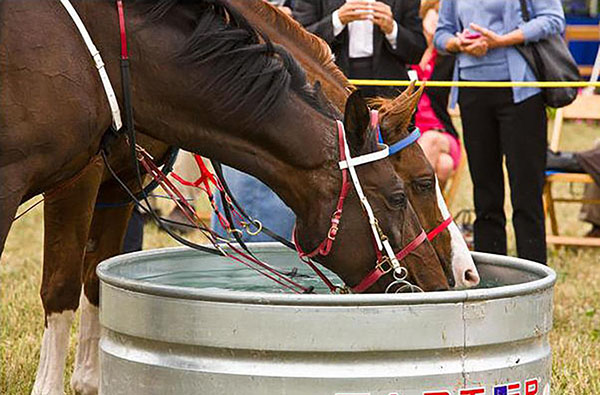Warning of Horse and Livestock Heat Stress Dangers as Temperatures Rise
By: Aimee Nielson, UK Ag Equine Program (edited)
It’s already hot outside, but University of Kentucky agricultural meteorologist Matthew Dixon said it’s about to get even hotter, and livestock producers and horse owners need to do what they can to minimize animal stress.
“Much of the state is under an excessive heat warning through Sunday evening,” Dixon said. “We expect highs to jump into the low to middle 90s each day. Some areas hitting the upper 90s cannot be ruled out. Combined with elevated humidity, peak heat indices will likely run between 100 and 110 degrees. This heat will push the livestock heat stress index into the Danger to Emergency categories during the afternoon and evening hours.”
The combination of heat and humidity can cause concern for livestock.
“The livestock heat stress index helps us determine what level of concern farmers and pet owners need to have for their animals,” said Dixon, who works with the Agricultural Weather Center in the UK College of Agriculture, Food and Environment. “That index helps producers know when heat stress could create a problem for their animals, so they can be even more vigilant in making sure they have to the necessary resources to combat the stress.”
Many livestock producers are familiar with the steps they need to take to help animals endure these dangerous conditions.
“The most important thing producers can do is provide cool, clean water and shade,” said Jeff Lehmkuhler, UK beef specialist. “It’s also a good idea to avoid working or transporting animals during periods of danger or emergency heat stress.”
Horses have difficulty regulating their body temperature when temperatures exceed 90 degrees. If humidity is high, the temperature doesn’t even have to reach 90 degrees to make life uncomfortable.
“Horse owners can reduce heat stress by scheduling activities during the cooler part of the day and making sure horses have plenty of water,” said Bob Coleman, UK equine extension specialist. “If you do transport horses during the cooler part of the day, give water before, during and after transportation to reduce the risk of dehydration.”
Coleman added that even non-working horses will double their water intake during hot weather. Owners should allow them to drink often to help maintain water balance.
“If you let them drink often, it can relieve the horse’s urge to drink a lot of water after exercise, and they need to gradually drink after a workout,” he said. “Also remember, lactating mares have special water requirements, because they are using water for milk production as well as body temperature regulation.”
Hot weather also increases horses’ need for salt, because they lose the mineral during sweating.
For dairy cattle, it is important to keep buildings as open as possible to allow air to circulate. Fans can make a big difference, and sprinkler systems that periodically spray a cool mist on the animals are also beneficial.
Poultry are especially prone to heat stress. Mortality during extreme heat can be significant, and egg production and hatching rates can drop.
“Since the birds don’t have sweat glands to help get rid of excess body heat, they have to pant to cool down,” said Jacquie Jacob, UK poultry extension project manager. “It’s important to make sure chickens are in well-ventilated areas and they have access to clean, cool water at all times.”
The UK Agricultural Weather Center provides statewide and county-specific weather information, alerts, livestock heat stress conditions and more. To view the index for a specific location, go to http://weather.uky.edu/ukawc2.php or click a specific location from the Kentucky map at http://weather.uky.edu.











